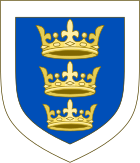Our website is made possible by displaying online advertisements to our visitors.
Please consider supporting us by disabling your ad blocker.
Poynings' Law (on certification of acts)
| Act of Parliament | |
 | |
| Long title | An Act that no Parliament be holden in this Land until the Acts be certified into England. |
|---|---|
| Citation | 10 Hen. 7. c. 4 (I) (The Irish Statutes numbering) 10 Hen. 7. c. 9 (I) (Analecta Hibernica numbering) |
| Introduced by | Probably Sir Edward Poynings, Lord Deputy of Ireland |
| Territorial extent | Ireland |
| Dates | |
| Commencement | 1 December 1494 |
| Repealed | 13 August 1878 |
| Other legislation | |
| Repealed by | Statute Law Revision (Ireland) Act 1878 |
Status: Repealed | |
| Text of statute as originally enacted | |
Poynings' Law or the Statute of Drogheda[1] (10 Hen. 7. c. 4 (I) [The Irish Statutes numbering] or 10 Hen. 7. c. 9 (I) [Analecta Hibernica numbering]; later titled "An Act that no Parliament be holden in this Land until the Acts be certified into England") was a 1494 Act of the Parliament of Ireland which provided that the parliament could not meet until its proposed legislation had been approved both by Ireland's Lord Deputy and Privy Council and by England's monarch (the Lord of Ireland) and Privy Council. It was a major grievance in 18th-century Ireland, was amended by the Constitution of 1782, rendered moot by the Acts of Union 1800, and repealed by the Statute Law Revision (Ireland) Act 1878 (41 & 42 Vict. c. 57).
- ^ Baker, John Hamilton (2003). The Oxford History of the Laws of England. Vol. VI: 1483-1558. Oxford University Press. p. 110. ISBN 9780198258179. Retrieved 11 March 2015.
Previous Page Next Page



